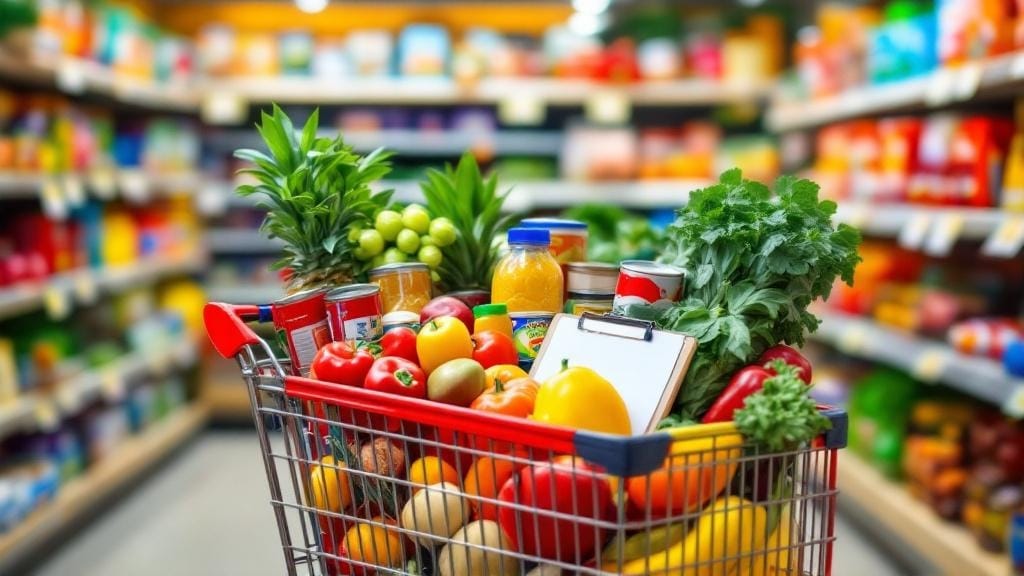Grocery shopping is a necessity for everyone, but that doesn’t mean it needs to break the bank. With food prices rising steadily in many parts of the world, managing your grocery budget efficiently has become more crucial than ever. Whether you’re trying to save money for a special goal or simply make your monthly budget stretch further, there are plenty of budget tips for grocery savings that can make a big difference.
In this article, we’ll share practical and actionable tips that will help you save money on groceries, from planning meals wisely to taking advantage of discounts and store programs. Let’s dive in!
Why Grocery Budgeting Matters
Before we jump into specific grocery budget tips, let’s take a moment to understand why budgeting your grocery expenses is important.
-
Rising Food Prices: Groceries are often one of the biggest monthly expenses for households. With food prices rising, being mindful of your spending can help keep your finances in check.
-
Reducing Waste: Improper planning can lead to food waste, which not only hurts your wallet but also has environmental consequences.
-
Freeing Up Cash for Other Goals: Saving money on groceries opens up funds that can be used for other important financial goals, like paying off debt or investing in your future.
By using smart strategies, you can enjoy your meals without feeling guilty about overspending. Let’s explore how to make that happen!
1. Budget Tips for Grocery Savings: Set a Weekly Grocery Budget
A great place to start is by setting a weekly grocery budget. Without a clear budget, it’s easy to overspend. By establishing a limit and sticking to it, you’ll gain better control over your grocery expenses.
Tips to Set Your Grocery Budget:
-
Track Your Spending: For one month, track how much you spend on groceries. This will give you a realistic idea of your average expenditure.
-
Prioritize Necessities: Focus on your essential items—like fruits, vegetables, and grains—and avoid unnecessary impulse buys.
-
Consider Special Occasions: Factor in special events or holidays when setting your budget for the month.
Setting a weekly grocery budget helps you plan your meals more effectively and avoid the temptation of overspending.
2. Plan Your Meals Ahead of Time
One of the most effective grocery cost-cutting strategies is meal planning. By planning your meals for the week, you’ll not only avoid impulse purchases, but you’ll also reduce food waste and make the most of what you buy.
Tips for Meal Planning:
-
Use Leftovers: Plan meals that can incorporate leftovers. For example, a roast chicken on Monday can be used for chicken salad on Wednesday.
-
Batch Cooking: Make large batches of soup, pasta, or stew that can be used throughout the week.
-
Try Meatless Meals: Incorporating a few meatless meals into your plan can significantly reduce your grocery expenses, as meat is often one of the priciest items on your shopping list.
Meal prep is a smart and simple way to lower your grocery bill and ensure that you’re using everything you buy efficiently.
3. Take Advantage of Discounts and Coupons
One of the best cheap grocery shopping tips is to make use of discounts and coupons. You don’t have to spend hours clipping coupons, but there are simple ways to maximize savings.
How to Use Coupons and Discounts:
-
Online Grocery Coupons: Many stores offer digital coupons that can be applied directly at checkout, saving you a lot of money without the hassle.
-
Store Loyalty Programs: Join store loyalty programs to earn points and get exclusive discounts.
-
Compare Prices: Use apps to compare prices for groceries at different stores and make sure you’re getting the best deal.
By actively seeking discounts and utilizing coupons, you’ll be able to get more for your money, making your grocery shopping experience much more affordable.
4. Buy in Bulk
Another effective grocery savings strategy is buying in bulk. Bulk buying often results in lower prices per unit, especially for non-perishable items like pasta, rice, and canned goods. If you have the storage space, this can be an excellent way to cut your grocery costs in the long run.
Bulk Buying Tips:
-
Non-perishables: Items like beans, grains, and frozen vegetables are perfect for buying in bulk.
-
Consider Shelf Life: Only buy items in bulk that you know you’ll use before they expire.
-
Split Bulk Purchases: If you can’t use large quantities, consider splitting bulk purchases with friends or family to reduce waste.
Bulk buying can seem like a large upfront investment, but over time, the savings add up.
5. Shop Seasonally
When you shop seasonally, you’re more likely to get the freshest produce at the best prices. Seasonal items are often in abundance, which drives prices down, making them more affordable for you.
How to Shop Seasonally:
-
Know What’s In Season: Research what fruits and vegetables are in season during each month to get the best deals.
-
Buy Frozen: When certain produce items are out of season, consider buying frozen versions, which are often cheaper but still nutritious.
Shopping seasonally allows you to take advantage of lower prices and fresher produce, making it easier to eat healthy on a budget.
6. Use Store Brands
You can save a significant amount by switching to store-brand products. Many store brands offer the same quality as name-brand items, but at a fraction of the price. This is one of the simplest and most effective budget-friendly grocery ideas.
How to Save with Store Brands:
-
Staple Items: Store brands work well for pantry staples like flour, sugar, and canned goods.
-
Quality Check: Try the store brand first and check the quality before committing to it long-term.
Store brands are often just as good as name brands, so making the switch is an easy way to save without sacrificing quality.
7. Avoid Shopping When Hungry
This one might seem obvious, but it’s an important tip to remember. Shopping when you’re hungry can lead to impulse buys, often on unhealthy or expensive items. Eating before heading to the store will help you stay focused on your grocery list and avoid temptation.
8. Use Grocery Shopping Apps
Thanks to technology, there are now many online grocery shopping savings opportunities. Apps like Ibotta, Rakuten, and Honey offer cash-back rewards and discounts for shopping at select stores. You can also track prices and compare products directly from your phone.
Benefits of Grocery Shopping Apps:
-
Price Alerts: Set price alerts for your favorite items and get notified when they go on sale.
-
Cash-back Offers: Take advantage of apps that provide cash-back for grocery purchases.
By integrating shopping apps into your routine, you can find extra savings that you might otherwise miss.
9. Reduce Food Waste
Food waste is a big contributor to unnecessary spending. By reducing food waste, you can make sure that every penny you spend on groceries is put to good use.
How to Reduce Food Waste:
-
Proper Storage: Learn how to store fruits, vegetables, and other perishables properly to extend their shelf life.
-
Repurpose Leftovers: Be creative with leftovers and use them in different meals.
-
Don’t Overbuy: Stick to your grocery list and avoid purchasing items that won’t be used within the week.
The less food you waste, the more your grocery budget stretches, and the better it is for your wallet and the planet.
10. Use Meal Prep to Save Even More
Meal prepping is one of the most effective frugal grocery shopping strategies to save money. When you prepare meals in advance, you ensure that you’re not spending extra on takeout or eating out. Plus, you can buy ingredients in bulk, further lowering costs.
Tips for Meal Prep:
-
Plan for the Week: Choose simple, inexpensive meals that you can prepare in bulk, such as casseroles or stir-fries.
-
Batch Cook: Cook large portions at once and freeze leftovers for later use.
Meal prepping not only saves you money, but it also saves you time during the week.
FAQs: Your Budget Grocery Questions Answered
1. How can I set a grocery budget for my family?
To set a weekly grocery budget for your family, track your current spending for a month, prioritize essentials, and stick to the list to avoid impulse buys. Don’t forget to factor in household size and dietary needs.
2. What are the best tips for saving money on groceries?
The best grocery cost-cutting strategies include meal planning, buying in bulk, using coupons, and taking advantage of store loyalty programs. Also, avoid shopping when hungry and opt for store-brand items.
3. How can I save on organic groceries?
To save on organic items, buy in season, purchase in bulk, and use store loyalty programs. Also, try organic frozen fruits and vegetables, which are usually more affordable.
4. How can I reduce food waste while grocery shopping?
To reduce food waste, stick to your shopping list, use leftovers creatively, and learn how to properly store perishable items to extend their shelf life.
5. Are there any tips for shopping at discount grocery stores?
When shopping at discount grocery stores, make sure to compare prices, look for coupons, and purchase bulk items. Also, consider buying in-store brands for additional savings.
6. Can I save money with meal prep?
Yes! Meal prep for grocery savings helps you buy ingredients in bulk, use leftovers efficiently, and avoid expensive last-minute takeout. Preparing meals ahead








Comments (0)